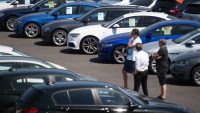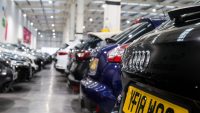The ban on selling new petrol and diesel cars from 2030 is still government policy, the prime minister has said.
Rishi Sunak had been under increasing pressure to row back on the ban after more than 40 Tory MPs and peers wrote to him calling for the deadline to be pushed back.
However, the PM said it remained part of his agenda, reiterating his commitment to move to net zero in a ‘proportionate and pragmatic way’.
It follows mixed messages last week when it appeared at one point that the government was going to delay the ban.
But it has now sent out a strong message to the contrary, with energy minister Andrew Bowie echoing Sunak by telling Sky News ‘we remain committed to ensuring that more people get access to, are able to buy, are able to drive electric and hybrid cars’.
Speaking to BBC Radio Scotland’s Good Morning Scotland programme today about the 2030 ban, Sunak said: ‘That’s about new cars, not all existing cars. So it’s the sale of new cars.
‘That’s been the government’s policy for a long time. It remains the government’s policy.
‘But what I have said more generally on my approach is that we will transition to net zero.
‘I’m committed to it, but we will do it in a proportionate and pragmatic way that doesn’t necessarily add burden or cost to families’ bills, particularly at a time when inflation is higher than any of us would have liked.’
Bowie told ITV’s Good Morning Britain: ‘The prime minister has been quite clear we are committed to the 2030 target for the phasing out of new petrol or diesel cars, the sale of that.’
Their comments came as the PM announced at least 100 new oil and sea gas licences alongside a new carbon-capture scheme in north-east Scotland.
However, ex-Tory party leader Sir Iain Duncan Smith warned the UK risks ‘simply becoming even more dependent on China’ if the 2030 target isn’t pushed back.
He told Sky News the 2030 date was ‘plucked out of nowhere’, adding: ‘If we rush to this, what we risk right now is simply becoming even more dependent on China.
‘China is ready to literally flood the market here with cheap electric cars, all their battery companies, which by the way are many, and they produce far more batteries than the whole of Europe put together.
‘They are going to dump those on us.
‘There’s also issues around security, our ability to switch those batteries off.’
He added: ‘So it’s important for us to have another look at that 2030 target because it’s pretty arbitrary and Europe, for example, has moved the target back to 2035, America is back at 2035.
‘We are rapidly becoming the only developed country in the world that is still clinging to an arbitrary target which we probably won’t make, and which is going to destroy much of our industry.’


































